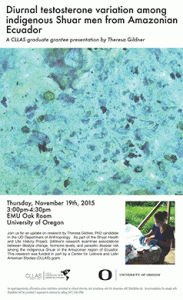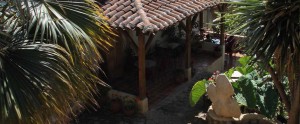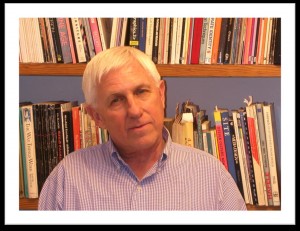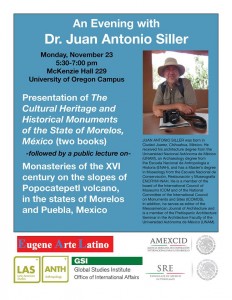Past Events
LAS Winter Speaker Series: Edy Kaufman
February 2, 2016 at 3:30 p.m. Knight Library Browsing Room
The Jewish Dimension in the Repression Under Military Rule in Argentina [1976-1983]: The Bigger Picture and a Case Study
Dr. Edward Edy Kaufman holds degrees in Political Science, International Relations and Sociology from the Hebrew
University of Jerusalem, a doctorate from the University of Paris (Sorbonne) in diplomatic history and post-doctoral
studies in Social Science Research Methodology at the University of Michigan, Ann Arbor. He has authored and coauthored
12 books and more than seventy articles in the general area of international relations, with an emphasis on
human rights and conflict resolution topics, and a regional specialization on Latin America and the Middle East, and
continues more than two decades team-teaching with one of them. His current research and advocacy interest are in
merging the paradigms of human rights and conflict resolution.
Prof. Kaufman has served both as Director of Center for International Development and Conflict Management [CIDCM]
at the University of Maryland and the Truman Institute for the Advancement of Peace at the Hebrew University in
Jerusalem. Dr. Kaufman is an expert in the areas of the teaching and training of conflict transformation, and
facilitation of workshops with CIDCM’s “Partners in Conflict” program. He has done extensive action research in
strengthening civil society and peacebuilding with the Palestinian-Israeli conflict, often also working jointly with
Egyptians and Jordanians,, as well as in Africa, Central, East and South Asia, the Former Soviet Union and the
Americas, including on ethnic, religious and water resource conflicts as well as human rights and democracy issues.
In the area of human rights, his work focuses on human rights education and training of the law enforcement
agencies, particularly in Latin America.
[embeddoc url=”https://las.uoregon.edu/files/2016/01/W16-LAS-Speaker-Series-1wkd0rr.pdf” download=”all” viewer=”google”]
LAS Winter Speaker Series: Edy Kaufman
January 26, 2016 at 3:30 p.m. Knight Library Browsing Room
Latin America and the Israeli/Palestinian Conflict: Part of the Problem or Part of the Solution?
Dr. Edward Edy Kaufman holds degrees in Political Science, International Relations and Sociology from the Hebrew
University of Jerusalem, a doctorate from the University of Paris (Sorbonne) in diplomatic history and post-doctoral
studies in Social Science Research Methodology at the University of Michigan, Ann Arbor. He has authored and coauthored
12 books and more than seventy articles in the general area of international relations, with an emphasis on
human rights and conflict resolution topics, and a regional specialization on Latin America and the Middle East, and
continues more than two decades team-teaching with one of them. His current research and advocacy interest are in
merging the paradigms of human rights and conflict resolution.
Prof. Kaufman has served both as Director of Center for International Development and Conflict Management [CIDCM]
at the University of Maryland and the Truman Institute for the Advancement of Peace at the Hebrew University in
Jerusalem. Dr. Kaufman is an expert in the areas of the teaching and training of conflict transformation, and
facilitation of workshops with CIDCM’s “Partners in Conflict” program. He has done extensive action research in
strengthening civil society and peacebuilding with the Palestinian-Israeli conflict, often also working jointly with
Egyptians and Jordanians,, as well as in Africa, Central, East and South Asia, the Former Soviet Union and the
Americas, including on ethnic, religious and water resource conflicts as well as human rights and democracy issues.
In the area of human rights, his work focuses on human rights education and training of the law enforcement
agencies, particularly in Latin America.
[embeddoc url=”https://las.uoregon.edu/files/2016/01/W16-LAS-Speaker-Series-1wkd0rr.pdf” download=”all” viewer=”google”]
CLLAS Graduate Student Grantee Presentation: Theresa Gildner, Anthropology
Diurnal Testosterone Variation Among Indigenous Shuar Men from Amazonian Ecuador
November 19, 3:00-4:30 pm, Oak Room Erb Memorial Union 1222 E. 13th Ave.
Theresa Gildner, a PhD candidate in the UO Department of Anthropology, received a 2015 CLLAS Graduate Student Research Award for her research on the Shuar in Ecuador.
 Theresa Gildner, PhD candidate, Department of Anthropology, Abstract: Lifestyle change, hormone levels, and parasitic disease risk among the Shuar in Ecuador—This study examines how hormone levels and economic change influence parasitic infection by comparing rural and urban areas with respect to testosterone profiles and parasite load as part of the Shuar Health and Life History Project. The results will clarify associations between lifestyle change, hormone levels, and parasitic disease risk and will also help target public health strategies and produce knowledge that will be used to help alleviate the physical suffering of participant communities.
Theresa Gildner, PhD candidate, Department of Anthropology, Abstract: Lifestyle change, hormone levels, and parasitic disease risk among the Shuar in Ecuador—This study examines how hormone levels and economic change influence parasitic infection by comparing rural and urban areas with respect to testosterone profiles and parasite load as part of the Shuar Health and Life History Project. The results will clarify associations between lifestyle change, hormone levels, and parasitic disease risk and will also help target public health strategies and produce knowledge that will be used to help alleviate the physical suffering of participant communities.
Dr. Juan Antonio Siller on Colonial Monasteries on the slopes of Popocatepetl: Book Presentation and Lecture
Monday, Nov. 23rd 5:30-7:00 pm McKenzie Hall, 229
5:30-6:00- Presentation of Dr. Siller two books: The Cultural Heritage and Historical Monuments of the State of Morelos, (two publications)
First study on the cultural heritage of the state of Morelos, studies of more than five thousand historic buildings from the sixteenth to the twentieth century in 33 municipalities of the state of Morelos were made. The books were presented at the International Book Fair of Palacio de Mineria de la UNAM. Autonomous University of Mexico City, the first volume in 2014 and the second volume in 2015.
6:00-7:00- Monasteries of the XVI century on the slopes of Popocatepetl volcano, in the states of Morelos and Puebla, Mexico.
Declared Cultural Heritage of Humanity by UNESCO (1995-2015). The route of the monasteries in the sixteenth century and its 14 monumental was declared Cultural Heritage of Humanity in 1994 by UNESCO. It includes eleven sites of Morelos State and three sites of Puebla State. This archaeological project is the route from the sixteenth century sources along 240 kilometers for 10 days walking tour, identifying the original routes, which still function as ways of pilgrimage to Chalma from the east of the Puebla and Morelos states. The route has remained in operation and use for over five hundred years.
JUAN ANTONIO SILLER was born in Ciudad Juarez, Chihuahua, México. He received his architecture degree from the Universidad Nacional Autónoma de México (UNAM), an Archaeology degree from the Escuela Nacional de Antropología e Historia (ENAH), and has a Master’s degree in Museology from the Escuela Nacional de Conservación, Restauración y Museografía ENCRYM INAH. He is a member of the board of the International Council of Museums ICOM and of the National Committee of the International Council on Monuments and Sites (ICOMOS). In addition, he serves as editor of the Mesoamerican Journal of Architecture and is a member of the Prehispanic Architecture Seminar in the Architecture Faculty of the Universidad Autónoma de México (UNAM).
“Maíz y el país: Political Violence in Mexico and Corn’s Lessons for Justice”
“Maíz y el país: Political Violence in Mexico and Corn’s Lessons for Justice” with with Luz Rivera Martínez, organizer with the Consejo Nacional Urbano y Campesino (CNUC) and the Mexico Solidarity Network (MSN). This talk is co-sponsored by Food Studies and Latin American Studies.
Luz Rivera will speak about State-sponsored political violence in Mexico and how corn is a symbol for autonomy and the dignified struggle for a better world. Luz has 20 years of experience constructing autonomy, organizing outside the electoral system, and resisting genetically modified corn while protecting millennia-old varieties. Luz is an amazingly inspiring speaker with a wealth of experience and her talk will have important lessons for anyone interested in human rights, women’s, peasant, and labor movements.
Trans-American Experience Conference Nov 5-7
This conference aims to explore the pluriversal spaces for thought that one finds in the Americas and the way these may be brought together in diverse crossings, encounters, and dialogues. Papers may range from the exploration of the various traditions of thought that compose Latin American, Caribbean, and North American philosophy and the way these interconnect, to engaging traditions and ways of thought not often recognized within the discipline of philosophy, such as indigenous thought, literature, music, the arts, and popular culture in transformative dialogue with philosophy. Accepted papers will be considered for publication in a special issue of The Inter-American Journal of Philosophy. Most meetings will take place in the Jacqua Center
For more information contact: Alejandro Vallega (Philosophy)
Trans-American Philosophy Conference.
November 5-7
39324 UO Philosophy 11×17
[embeddoc url=”https://las.uoregon.edu/files/2015/09/Trans-American-Experience-program-copy-r5ncj0.docx” download=”all” viewer=”microsoft”]
Roundtable on “The Future of Latin American Studies”
October 29th, Thursday. 1:00-2:30. Knight Library, Room 122. Guest speaker José Antonio Mazzotti will engage graduate students and faculty members in a conversation about the future of the field of Latin American Studies in U.S. research universities. Please join us for an open conversation. Coffee and cookies.
Public Lecture “Documenting the Iskonawa of the Amazon: Challenges to the Latin American Literary Canon”
Thursday, October 29th, 2015
3:30 p.m. Browsing Room, Knight Library.
Through interdisciplinary research and recent fieldwork, this talk will present an ongoing project that documents an endangered community: the Iskonawa of the Peruvian central Amazon forest. The Iskonawa oral tradition is full of knowledge about nature and survival strategies that speak volumes about the environment and the possibility of coexistence among humans and between humans and nature. However, like all indigenous societies in Latin America, the Isknonawa are threatened by deforestation, contamination, crime and drug trafficking. This case study also sheds light on canonic texts of the indigenista literary tradition and challenges some premises of postcolonial and decolonial theory.[embeddoc url=”https://las.uoregon.edu/files/2015/10/Poster-Mazzotti-UO-visit-2bd69jn.pdf” download=”all” viewer=”google”]
Study abroad program in Chiapas
A new study abroad program in Chiapas, Mexico is coming to the UO this summer. You can find out more at two events this week:
Another World is Possible: Service Learning and Intercultural Engagement Across Communities in Chiapas Tuesday October 13, 4:00 to 5:00 pm Friendly 214 Instituto de Lenguas Jovel Director Helga Loebell and Faculty Advisor Analisa Taylor give a sneak peek of the new UO Chiapas Program’s model of academic and public engagement through service learning, sharing with students and faculty how this program creates safe and socially responsible research and internship opportunities that benefit students as well as in-country organizations and communities. Refreshments provided.
Mayan Communities and Social Justice in Chiapas: Summer 2016 Program Open House for Students Wednesday October 14, 2:00 pm to 4:00 pm Volcanology 101 Join Program Director Helga Loebell and Faculty Advisor Analisa Taylor for an afternoon snack and virtual tour of the Chiapas Program that will take place in San Cristóbal de las Casas, Mexico July 17 to September 3, 2016. We’ll give you details on scholarships, courses, prerequisites, home stays, internship opportunities, planned adventures, and more. Refreshments provided.
Both events are free and open to the public. Sponsored by the Department of Romance Languages, the Office of International Affairs and the UO Global Justice Program.
Program Details:
This 7-week program offers you the opportunity to earn twelve upper division credits in Spanish through courses on Indigenous History and Culture in Chiapas, Mesoamerican Foodways, and Academic and Public Engagement across Communities. UO participants team up with Mexican youth to design and implement hands-on social, environmental, or cultural projects oriented toward your mutual interests. Excursions in and around San Cristóbal draw on the knowledge of local experts in fields such as Mayan History, Art, and Culture, Human Rights, Food Justice, and Environmental Education to create a holistic program of cultural and academic discovery.
With a population of approximately 200,000 people, San Cristóbal de las Casas is one of the oldest colonial cities in the Americas, and has been a center of Maya civilization for thousands of years before that. Highland Maya culture, crisp mountain air, and a cluster of internationally renowned universities, research institutes, and non-profit grassroots organizations make this quaint big city a magnet for curious idealists from all over the world and a cozy perch from which to explore the archaeological, natural, and cultural wonders of Southern Mexico and the Yucatán Peninsula.
Operating continuously since 1993, the Instituto de Lenguas Jovel is unmatched in Chiapas for its academic quality and reputation for social responsibility in working with community partners. The Instituto Jovel offers courses in Spanish, German, English, Tzotzil and Tzeltal, as well as cultural programming and workshops, making it a multicultural haven that echoes the provincial charm and international pulse of San Cristóbal. Instructors build museum tours and around-town exploration into their curricula, and Helga Loebell coordinates language exchanges, dance lessons, and cooking classes. Excellent yoga, dance, and martial arts studios are all within a few blocks of the school and students’ home stays.
See here  for a quick tour of the school and its setting in San Cristóbal. Please contact Professor Analisa Taylor at Analisa@uoregon.edu or Rick Batchelor at
for a quick tour of the school and its setting in San Cristóbal. Please contact Professor Analisa Taylor at Analisa@uoregon.edu or Rick Batchelor at
rbatche2@uoregon.edu for more information.
Program Dates: July 17-Sept 3, 2016
Application Deadline: March 1, 2016
Gustavo Germano’s Exhibit and Talk
The Latin American Studies Program had the honor of bringing to the University of Oregon acclaimed photographer Gustavo Germano’s exhibit Ausencias and the artist himself. The photographic exhibit is on view until August 18 at the Jordan Schnitzer Museum of Art. Family passes are available to the public–those interested please contact Monique Balbuena at balbuena@uoregon.edu
Gustavo Germano visited the campus in May. He met with students in the Clark Honors College, visited Prof. Terri Warpinski’s Advanced Photography class, met with several faculty, advised professors and curators on their Human Rights class, and gave LAS’ annual talk, the Bartolomé de las Casas Lecture.
A video of the lecture can be accessed here
A radio interview at the university radio is also available and will be posted soon.

